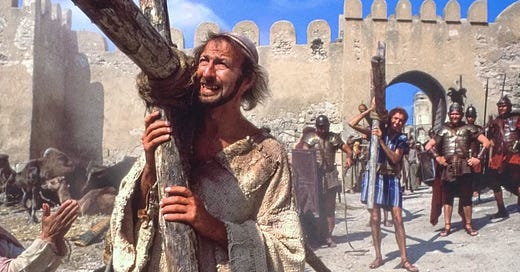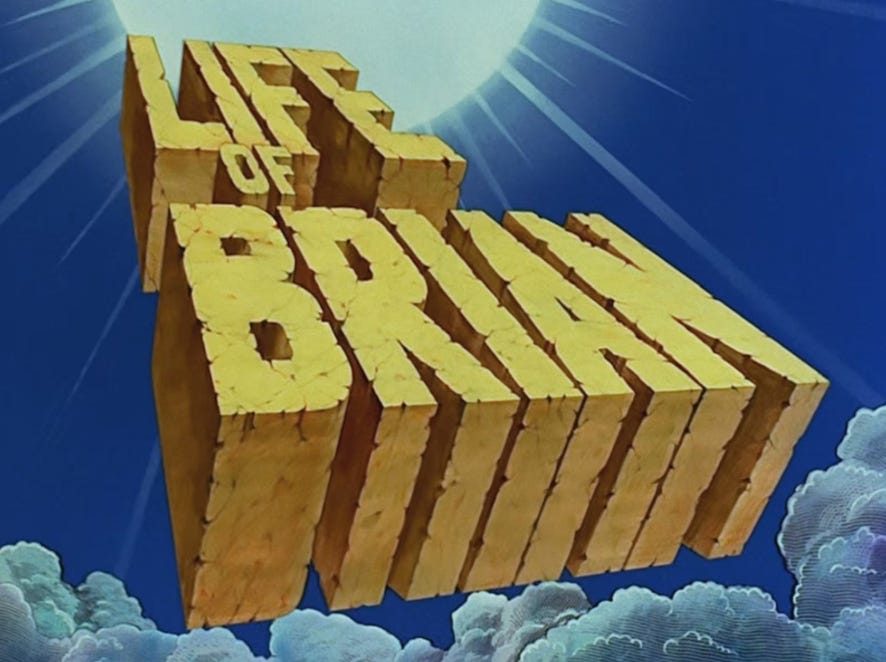"To me, it's Python's finest moment" Terry Gilliam celebrates Life of Brian at 45
As Monty Python's Life of Brian hits the grand old age of 45, I spoke to the Python's resident animator Terry Gilliam about its turbulent creation, controversial release and iconic legacy...
Before we get to the article, some context…
This piece originally ran in the final ever issue of Total Film magazine. To feature in the closing edition of something that has played a huge part in my career was a particularly special moment for me. While the physical magazine is no longer available, digital copies are still available - and I’d urge you to buy one if you’re a fan of in-depth movie writing.
Anyway. Terry Gilliam was as fun to talk to as you might imagine and I had lots of stuff left over from this chat that I can publish in future, if people are interested in reading it.
In the meantime, he’s not the Messiah, he- well, you know the rest.
“To me, it’s Python’s finest moment,” grins Terry Gilliam, one-sixth of the legendary British comedy troupe Monty Python. He’s of course talking about the group’s controversial second feature Monty Python’s Life of Brian a movie that somehow feels more timely than ever despite 45 years having passed since its 1979 debut. “We were very prescient,” he tells Buff. “Everything the modern world is railing about and unable to deal with, we were talking about back then when we were all young and healthy. It’s my favourite Python film.”
Perhaps Python’s strongest big-screen outing, Life of Brian puts the story of Christ in its comedy crosshairs, taking aim at all of religion’s wild miscommunications and contradictions without actually featuring the big guy upstairs - or their son - at all. Instead, it’s poor Brian (Graham Chapman) who finds himself on the wrong side of Rome’s wide-eyed believers when he’s not actually the messiah at all - he’s just a very naughty boy.
It was a story that caused more than a little outrage (“When you start dealing with people’s belief systems, they often get angry,” chuckles Gilliam of its impact) but one that Gilliam and his fellow Pythons John Cleese, Eric Idle, Michael Palin, Terry Jones and Graham Chapman felt was long overdue a piss-take. “We decided we weren’t going to attack Jesus,” says Gilliam, remembering the spark of the idea that piqued the Pythons’ interest. “He was a pretty good guy. We wanted to go after everybody else who created religions in his name - and those who didn’t.”
“Graham was great in it”
After some years apart working on solo projects, the Pythons reconvened in a swanky Barbados beach house to write Brian’s script where they were visited by a whose-who of late '70s British pop culture. “We were at the heart of cool Britania and it seemed to find us, even in Barbados,” says Gilliam, recalling visits from Mick Jagger and Jerry Hall. “We were having an interesting time working together again having been separated for quite a bit. Just being in one place together helped ideas flow much quicker.”
After successfully leading 1975’s Monty Python and the Holy Grail, it was decided that Chapman would take the lead as Brain. “Graham was great. It was interesting how he was the best leading man of the group and it was extraordinary to see how his presence held the thing together. I think he was happy to find a real sense of purpose [within Python].”
Meanwhile, Jones directed solo with his Holy Grail co-helmer Gilliam focusing on Production Design. “My joke was I was no longer a director - I was a rejecter,” laughs Gilliam, who released his first solo feature Jabberwocky just two years earlier. “Once I got out on my own, I found I really enjoyed directing and didn’t enjoy co-directing. The Pythons don’t really take direction,” he adds. “They don’t like directors - they do what they do and that’s the strength of the group.”
For Gilliam, ensuring Brian’s world was as authentic as possible was the key to helping the Python “nonsense play better.” This ethos brought the troupe to Monastir in Tunisia where they saved money by recycling sets from Franco Zeffirelli's Jesus of Nazareth TV series. “They were supposed to have been torn down but they were still there so we reorganised and reused it,” recalls Gilliam. “It saved us a whole lot of money.”
Speaking of dosh, it soon became a big point of contention. Despite bankrolling Brian, the big boss at film funder EMI hadn’t actually read the script - and when he did, he was suitably outraged. Thankfully, the Pythons’ had a little help from their friends - specifically former Beatle George Harrison who remortgaged his house, wrote a big fat cheque and allowed the film to keep going. “He was such a big Python fan,” says Gilliam of Harrison’s soft spot for silliness. “Thank God for that because it led to the salvation of the film.”
“I always knew I was going to be in for it… and I thought that was exciting!”
Upon release, Life of Brian was treated almost as badly as its unfortunate hero. Swiftly labelled blasphemy, it was banned in multiple countries - in some cases for decades. The Pythons couldn’t have asked for a better marketing boost. “I always knew I was going to be in for it and I thought that was exciting,” smiles Gilliam, who at one point considered a career as a Missionary. “There’s nothing more exciting than religions fighting against religions but they all teamed up,” he laughs. “We brought the Christians, Protestants, Jews and Catholics all together in a united front.”
45 years later, Life of Brian’s legacy remains a point of pride for this former Python: “We were saying important things and making people laugh. Some of the best Python scenes are in that film - and it’s about something,” suggests Gilliam. “I love that people still quote it.”
This article originally ran in the final issue of Total Film magazine. Buy a digital edition here.






